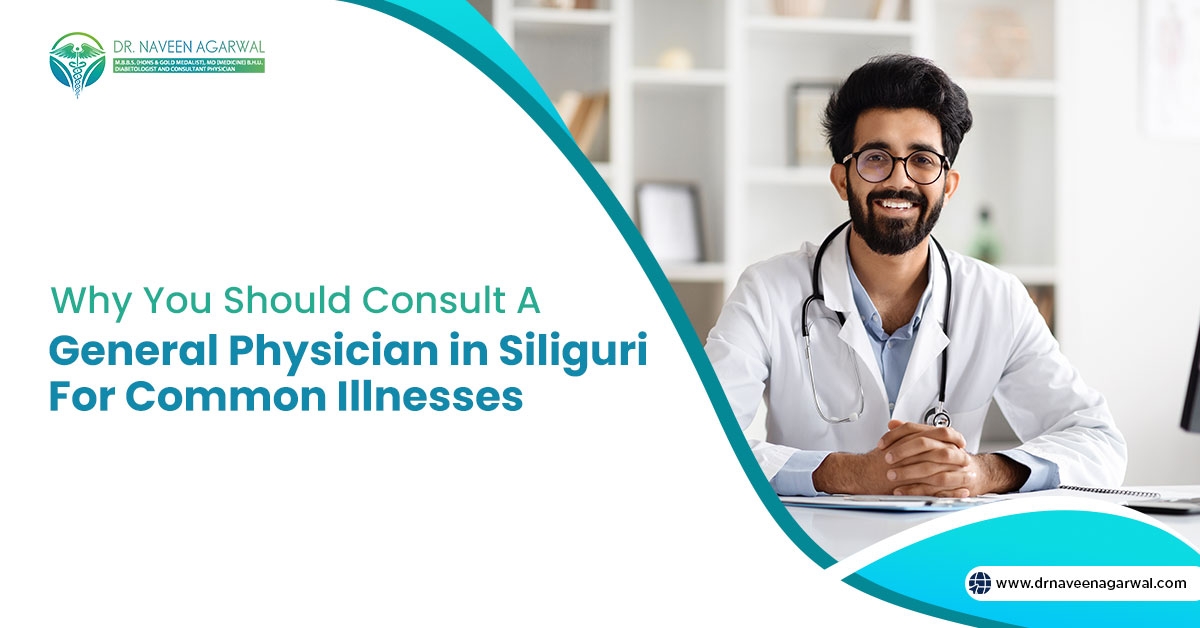If you’re looking for a trusted general physician in Siliguri, it helps to understand the important role they play in primary healthcare. General physicians are like the health guardians of your community; they're often the first people you turn to when you or your family members feel unwell. Whether it’s a common cold, managing chronic conditions like diabetes or hypertension, or getting advice on how to stay healthy, a good general physician is your partner in lifelong wellness.
A general physician, also called a family doctor, is usually the first point of contact for any health concern. They handle a wide range of medical issues from minor illnesses like colds, flu, or digestive problems to more serious conditions such as diabetes, high blood pressure, or heart problems.
Why Are General Physicians Crucial in Primary Healthcare?
1. Early Diagnosis and Prevention
One of the biggest advantages of visiting a general physician is early diagnosis. Many health issues start small and may not show clear symptoms at first. Regular check-ups and a doctor who knows your medical history can detect conditions before they become serious. This is at the core of primary healthcare, which is all about preventing illness rather than only treating it once it occurs.
For example, high blood pressure or early-stage diabetes often goes unnoticed until it causes major health problems. A general physician can spot these issues early through routine screenings and blood tests, saving you from complications later.
2. Holistic Health Management
General physicians don’t just treat one symptom; they focus on the big picture. A recurring headache, for instance, may not just be a sign of stress; it could indicate issues with blood pressure, vision, or even your diet. By considering all aspects of your lifestyle and medical history, they provide care that addresses the root cause, not just the surface problem.
This holistic approach makes general physicians essential to primary healthcare. They help patients understand how lifestyle choices like diet, exercise, and sleep impact long-term health and provide practical advice to make positive changes.
3. Referrals and Specialized Care
Sometimes, health issues require attention from specialists such as cardiologists, endocrinologists, or gastroenterologists. A good general physician acts as a guide, helping you find the right specialist and ensuring you don’t waste time or undergo unnecessary tests. They serve as the bridge between basic healthcare and specialized care, coordinating your treatment for better outcomes.
4. Chronic Disease Management
Managing chronic illnesses like diabetes, asthma, hypertension, or arthritis requires consistent care and monitoring. General physicians play a key role here. They track your condition, adjust medications when necessary, and provide lifestyle guidance to manage the illness effectively. Regular follow-ups with a trusted general physician can prevent complications, hospitalizations, and improve overall quality of life.
5. Health Education and Awareness
General physicians don’t just treat you, they also learn from you. They educate patients about preventive measures, vaccinations, healthy diets, exercise, and stress management. This awareness is a key part of strengthening community health because informed patients are better at preventing illnesses before they occur.
How Can Patients Choose a Good General Physician?
Finding the right general physician might feel a bit overwhelming, but it’s really not that complicated. Look for a doctor who has experience, is easy to talk to, and has good feedback from other patients. The most important thing is someone who listens to you, explains things in simple terms, and makes you feel comfortable during your visits.
You can ask friends or family for recommendations, check online reviews, and make sure the doctor is properly qualified. Even going for a simple health check-up can help you see if their approach feels right for you. A great doctor doesn’t just treat your symptoms; they make you feel heard, supported, and cared for every step of the way.
How Do General Physicians Manage Chronic Diseases?
Managing chronic diseases isn’t just about taking medicines; it's about having a plan that fits your daily life. A general physician keeps an eye on your condition, suggests changes to your diet, recommends exercises, tracks your medications, and schedules regular check-ups to make sure everything is on track.
Take diabetes, for example. A patient may need to monitor blood sugar regularly, adjust their lifestyle, and follow guidance on medications. A good general physician brings all these pieces together and makes sure they work smoothly. They also coordinate with specialists when needed, so your care is continuous and well-managed. This approach helps people live healthier lives and reduces the chances of complications.
The Everyday Impact of General Physicians
Think of a general physician as a guide who helps navigate the sometimes confusing healthcare system. They simplify your healthcare journey, whether it’s by prescribing medications, suggesting lifestyle changes, or connecting you with the right specialists. They save you time, reduce stress, and make sure you receive the care you need efficiently.
For families, a general physician often becomes a trusted health advisor over the years. They know your medical history, your concerns, and your preferences, which makes treatment far more personalized and effective. This kind of long-term relationship is invaluable, especially in primary healthcare.
When to Visit a General Physician
Many people only see a doctor when they feel sick, but regular visits to a general physician can prevent problems before they start. Routine check-ups, vaccination advice, screenings for blood pressure, cholesterol, and blood sugar, as well as discussions about lifestyle changes, can make a huge difference in overall health.
Even minor issues like persistent fatigue, headaches, or digestive problems shouldn’t be ignored. A general physician can identify whether these are signs of something larger or just temporary conditions, giving you peace of mind.
Finding the Right General Physician in Siliguri
When it comes to choosing a general physician in Siliguri, it’s important to find someone who is experienced, approachable, and genuinely cares about your health. A good general physician listens to your concerns, understands your medical history, and provides care that fits your lifestyle. From routine health check-ups to managing ongoing health conditions, the right doctor can guide you in staying healthy and making informed choices about your well-being. Taking the time to find a doctor you trust is the first step toward a healthier and happier life.
Conclusion
These days, with so many health challenges around us, having a good general physician is more important than ever. They’re not just doctors, they're your first line of support, your health guide, and someone who helps you stay well every day. From spotting problems early and giving preventive care to managing long-term illnesses and sharing useful health tips, general physicians make sure you’re taking care of yourself in the best way possible.
So whether it’s for regular check-ups, managing ongoing health issues, or just getting advice on staying healthy, having a trusted general physician in Siliguri like Dr. Naveen Agrawal can really make a difference. Your health deserves attention, care, and support, and a good doctor is there to provide exactly that.





